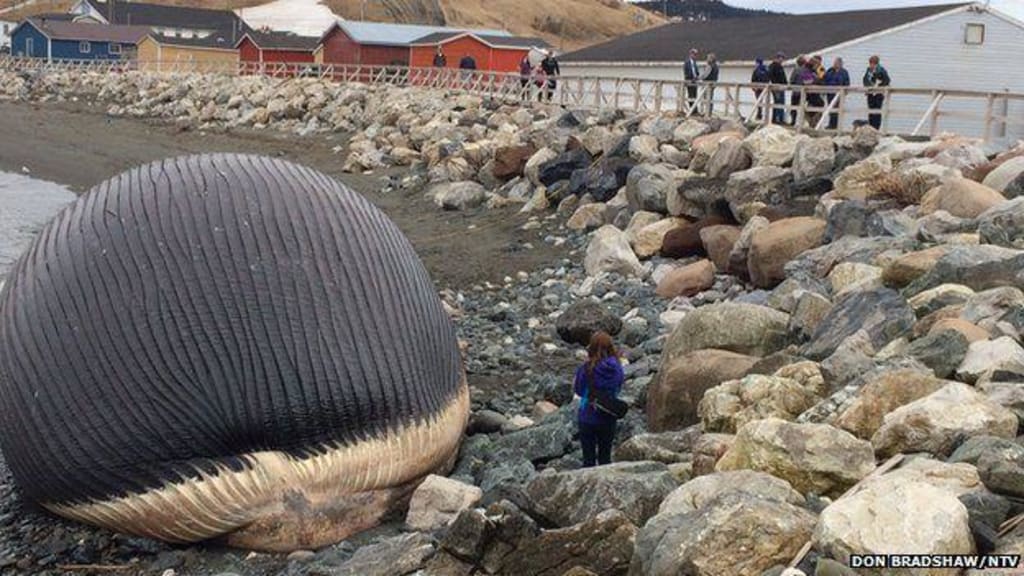Will the corpse of the highly corrupt giant view explode in an instant like the whale's "whale explosion"?
The phenomenon of "giant view"

Whale carcasses stranded on the beach always attract people's attention.
On the one hand, because of curiosity, everyone wants to observe large marine animals up close, but this is not the most important thing. Most people pay attention to whale carcasses because of the "whale explosion".
In April 2014, an 81-foot (24.7-meter) blue whale washed ashore, a well-known report at the time.
According to reports, the whale was very bloated, more than twice its normal size, and the air was filled with a foul stench. The kids were so intrigued by the big guy that they wanted to touch, poke, and jump on him.
The adults thought that such a swollen whale was very dangerous and life-threatening, so they repeatedly told their children to stay away from the whale carcass, and responded to the relevant departments, hoping to deal with the whale as soon as possible. Contrary to expectations, the whale carcass has always attracted the attention of children and even tourists.
Throughout history, there have been no instances of whale explosions being life-threatening, but people's concerns are unfounded.
Take the recent whale explosion as an example. In November 2013, after two sperm whales stranded and died, in order to harvest the bones of the whales for museum exhibitions, someone cut the whales at close range. Because they were professionals, nothing happened at that time. Accidents, however, are more unacceptable, sticky, foul-smelling innards spewing out for meters.
In 2004, there was also a whale explosion in Tainan, which occurred in a bustling street. When the whale carcass was transferred, the shops and vehicles on the roadside were stained with blood and internal organs. There were about 600 onlookers and merchants gathered. No one was injured, but the smell was really disgusting.
According to the person concerned, it took several days to clean up the streets and shops, and after several months, the stench could still be smelled.
From a scientific point of view, why do whale carcasses explode?
To put it simply, because of decomposition, a large amount of gas accumulates in the whale's body, and the gas becomes more and more, like an overly inflated balloon, which may burst with a poke.
Decomposition begins the moment the animal dies.
There are two ways to decompose, one is self-decomposition, also called autolysis. When the various functions of the body are stopped, the enzymes in the cells are released and start to break down the body cells.
On the other hand, the decomposition of bacteria is also carried out simultaneously, and the target of decomposition is the internal organs and tissues of the body, as well as the food left in the intestines.
During the decomposition process, various gases such as methane, ammonia, and hydrogen sulfide are produced in the body, and if the decomposition takes a longer time, foul-smelling substances such as cadaverine and putrescine are also produced.
On this basis, external environmental factors will also exacerbate the swelling of the corpse.
First of all, let's be clear: whales live in the ocean and die after stranding. They are generally washed up on the coast, and most of them are in relatively remote places.
So by the time a whale carcass is found, it's often been on the shore for hours, and the decomposition will only intensify as temperatures slowly climb under prolonged sunlight. More and more gas will be produced, and the volume will also increase.
However, there is a limit to the volume of the inner cavity of a whale, and the body is so large that it can only expand to this extent. After reaching the limit, the whale is like a sealed container, the volume remains the same, more and more gas is produced, and the pressure is increasing.
At this time, if a certain part of the whale's skin is relatively fragile or artificially cut, the gas is suddenly released, which will cause an explosion.
Will there be an "explosion" in the corruption of human corpses?
No matter how special human beings were during life, the body after death is no different from that of a whale. After the death of a person, the decomposition process is the same as that of a whale, and the phenomenon of "giant view" will appear when a high degree of corruption occurs.
At this time, the whole corpse is swollen and difficult to identify. The chest and abdomen will bulge and swell due to the accumulation of a lot of gas, and the limbs will also become larger and thicker. It can be said to be the usual "giant version".
In principle, there is also a large amount of gas inside the corpse of Giant View. If the gas finds a "breakthrough", it will also pour out, but this process is not as violent as a whale explosion.
According to a forensic doctor's description: a highly decomposed corpse will release a lot of unpleasant gas, but the gas is not "exploded", but "popped", and sometimes splashes along with the liquid.
At the same time, he also said that he had never seen an "exploded" body. And as the body continues to decompose, the swelling will slowly disappear, gradually liquefy, and eventually completely decompose, leaving behind hard-to-decompose tissue and white bones.
at last
It will also swell. Why do whales have a whale explosion, but the human body does not?
Whales are large in size, with large body cavity, thick skin and fat, and can hold more gas; most of the whales eat high-protein food, and a lot of gas is generated during decomposition; dead bodies on the beach are easily exposed to the sun, and the decomposition is also very violent.
From these factors alone, whale carcasses are very suitable for "whale explosion" and should be very common in reality.
However, the truth is that in nature, whale explosions are very rare. In addition to the requirements for the whale's own body (size, cause of death, location of death, etc.), there are also requirements for external factors, such as temperature, humidity, and pressure.
For individuals like whales, the appearance is rare. For human remains, the body cavity is small, and the subcutaneous fat is not as thick as that of whales. After death, most of the remains will choose to be cremated. Even if they choose to bury, some places will give priority to anti-corrosion measures. , the natural decomposition of corruption is rare.
In short, it is almost impossible for human remains to "explode".
About the Creator
Vicky
The world is so wonderful, let's get to know the world together!
Enjoyed the story? Support the Creator.
Subscribe for free to receive all their stories in your feed. You could also pledge your support or give them a one-off tip, letting them know you appreciate their work.
Reader insights
Nice work
Very well written. Keep up the good work!
Top insights
Easy to read and follow
Well-structured & engaging content
Expert insights and opinions
Arguments were carefully researched and presented
On-point and relevant
Writing reflected the title & theme






Comments (1)
Great insight! I am so glad human corpses don't explode. Talk about a nightmare. Now a whale exploding sounds very unpleasant but hopefully will never experience in my lifetime. Are you by chance familiar with the exploding whale of Florence, Oregon? A whale carcass washed ashore on the beach and they thought it would be a good idea to get rid of the carcass by using explosives. If you look it up on youtube there is old news footage of the whole thing. It is very entertaining!